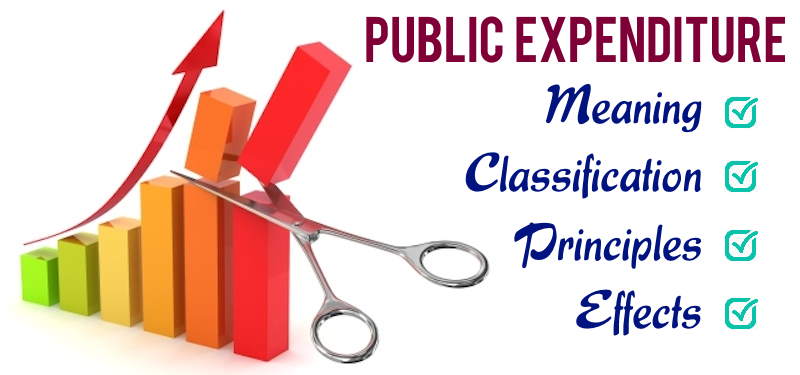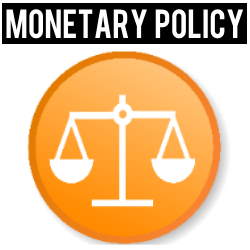Public Expenditure | Meaning, Classification, Principles, Effects
Table of Contents
What is Public Expenditure?
Public expenditure refers to expenditure of the government. In the past, the subject of public expenditure was neglected because the expenditure of the government was very small. There has been a persistent and continuous increase in public expenditures in countries all over the world. This tendency was observed in the 19th century itself but it has become clear and definite in the 20th century.

Adolf Wagner, a noted German fiscal theorist of the 19th century, presented his famous hypothesis “law of the increase of state activities” which has led to increase in public expenditure. He hypothesized as follows:
a. The New Concept of Welfare State
The 19th century State was mainly and basically a police State, but the 20th Century State is a Welfare State whose main objective is to promote the economic, political and social well being of citizens. Government spend money to create and maintain full employment, development programmes, education [free] and on social security measures.
b. War and War Programmes
Expenditure on national defence generally accounts for half of the total expenditure. Larger the country, greater the percentage of revenue allotted to national defence.
c. Growth of population and rise of towns
The continuous process of urbanization brings an expansion in expenditure on the protection of life and prosperity, and on public health, educations and other functions like hospitals, playgrounds, organized recreations, water, sewerage growth of network of roads, railways and provision of welfare and assistance.
d. The Great Depression [1929-33] and Extension of Government function
The great depression demonstrated the need for government to interfere and participate in economic activity and new functions. The government took various measures for the active encouragement of industry, agriculture, labour full employment, promoting public welfare, and control over all sectors of the economy.
The other causes for the growth of public expenditure includes, rise of democracy, rise in price levels, increase in public debt followed by increased interest rates, growth of the spirit of economic nationalism and desire for self sufficiency, etc.
Buchler, in his book “Public Finance”, says that, “to some persons any increase in public expenditure seems a calamity, to others it is a cause of rejoicing and to still others, it is a matter of indifference”. But public expenditure is growing at the rate of 15 to 20 percent per annum.
Classification of Public Expenditure
Different economists have classified Public Expenditure into different forms. Prof. Adam Smith has classified public expenditure on the basis of functions performed by the government. They are defence expenditure, commercial expenditure and development expenditure. Prof. Dalton classified public expenditure into grants and purchase price. When the government transfers its resource without any quid pro quo, it is grant. Expenditure incurred to provide services is grant.
When the government transfers revenue to individuals or community in return for specific services, it is called purchase price. Normally, public expenditure is classified into:
1. Revenue expenditure: This means expenditure on civil administration, defence and welfare schemes, etc.
2. Capital expenditure: This is incurred once and all. It is non-recurring expenditure. Expenditure on multipurpose projects, big factories like steel and cement, money spent on machinery, building and land are all capital expenditure.
3. Development expenditure: This is made on irrigational development, industrial development, education and health etc.
4. Non-development expenditure: This is the money spent on civil administration, police force, defence forces, judiciary, etc.
Principles / Canons of Public Expenditures
The principles of public expenditure are certain guidelines for the public authorities in spending government money. They are also known as canons of expenditure. These canons are:
1. Principle of Maximum Social Advantage
The objective behind this principle is that public money should be spent for general cause and must promote social welfare. It should not be spent for the benefit of a particular group of society. Public expenditure should result in increased production, elimination of inequality and promotion of welfare of all. It should secure internal peace and also protection from external aggression.
2. Canon of Economy
The authorities are expected to follow utmost economy in its expenditure. Public money should not be misused and not result in any wastage. Whenever money is raised by taxation, public expenditure in return should bring maximum benefit. It should not produce unfavorable effect on production. Canon of economy does not mean niggardliness or miserliness. It simply means the prevention of extravagance and waste of all kinds.
3. Canon of Sanction
Without the sanction of the public authority, no money should be spent. At the same time, the amount of money must be spent for the purpose for which it was sanctioned.
This will ensure that:
- waste and extravagance are avoided,
- there is proper audit done compulsorily,
- there is control and legislative supervision over public expenditure,
- It is seen whether the expenditure has fulfilled the objective.
In the absence of proper sanction, there may be misuse and misappropriation of public funds. The Public Accounts Committee established by every legislature sees that these objectives are achieved.
4. Canon of Elasticity
This implies that there should be scope for varying the expenditure according to need or circumstances. There should not be any rigidity in public expenditure.
5. Canon of Surplus
To greater extent, the government expenditure should lead to increased production, employment and income. The expenditure should be with in the revenue of the State. Deficit is permitted only for a short duration. In times of crisis, government is allowed to have deficit budget. The deficit must be made good after the normalcy returns.
Finally, public expenditure should promote economic growth, stability and social justice. Public expenditure should be directed to achieve economic and social objectives of the country.
Effects of Public Expenditure
Public expenditure is beneficial since it influences the economy in many directions. The effects of public expenditure are always beneficial. It increases the capacity of the people to produce output efficiently. It influences the production not only directly but also indirectly. It increases the community’s productive power. It promotes social and economic equality and finally increases income, employment and welfare.
1. Effects on production
Expenditure on defence becomes productive and it becomes a protective expenditure. Development of infrastructures facilitates production and thereby helps to increase national income and in turn per capita income. Expenditures on social services like free education, health and medical aid, which increase the capacity of the people to work and save and productive power.
2. Effects on distribution
Public expenditure is an ideal medium to remove economic inequalities in society. The government should tax more the rich. The amount so collected should be spent on free education, medical aid, cheap food, subsidized houses, old age pension, etc. This process of public expenditure will bring about redistribution of national income in favour of the poor.
3. Effects on income and employment
Public expenditure affects the level of income and employment in the country by removing the widespread unemployment. Investing more on public works like roads, hydro-electric generating works, etc. will create a multiplier effect on the economy and thereby increases the income and employment. This results in increased consumption and in turn develops the consumption goods industries and capital goods industries.
Thus, public expenditure plays a vital role in the economic development of a country. It also creates necessary environment for the expansion of private enterprise and initiative.


